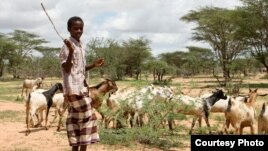22 December, 2014
51VOA听写整理,转载请注明出处。文本仅供参考,欢迎纠错!
From VOA Learning English, this is the Agriculture Report.
The northern part of the East African nation of Kenya is hot and gets little rain. The area has been suffering from periods of small amount of rainfalls and droughts, when almost no rain falls. This has been going on for many years. People who live there say the droughts are becoming more severe.
Herders are among those suffering the most. They are people who move with their animals from place to place. But over the past few years, many of the animals have died. The lack of rain has stopped the growth of grasses and other foods the animals eat.
Many of the herders have no animals left, so they are forced to become farmers. In their culture, being a herder brings them power and respect. Farmers are not as respected as herders.

The people of northern Kenya have traditionally been herders, since the land has long been considered too dry for farming November 28, 2014. (Hilary Heuler / VOA News)
Ali Abdi was a herder. His family was considered wealthy. He had respect from people in his home district of Garissa, in northern Kenya. Mr. Abdi had about 100 goats. He moved when the seasons changed, searching for new places for the goats to eat. But in 2012 and 2013, little rain fell, and Mr. Abdi's world changed.
As the pastures dried up, he says, his animals lost weight, then started to die. By the end of the drought, more than two-thirds of his goats were gone. They were the only way he could feed his family.
Ahmed Sheikh works at the Kenya Agricultural and Livestock Research Organization. He says Mr. Abdi was not the only herder who suffered.
"Most people actually went into destitution. People who had 100 heads of cattle remained with 10, goats the same. The herd size is what makes pastoralism a bit economical, but once the herd size shrinks it becomes really uneconomical."
This year drought has again hit Garissa, so Mr. Abdi made a difficult decision.
Mr. Abdi and about twelve other men and women are trying to grow crops. The group prepared about three hectares of land using long knives.
It was so difficult that some of them thought it would be impossible. But now they are growing fruits and vegetables, including bananas, tomatoes, chilies and lemons.
Some local people criticized Mr. Abdi for choosing to become a farmer.
Mr. Abdi says his wife was unhappy, because in their society a man who farms is considered lowly and poor. This is still true, he says, even though he now makes more money from his farm than he did with his goats.
And that's the VOA Learning English Agriculture Report. I'm Marsha James.